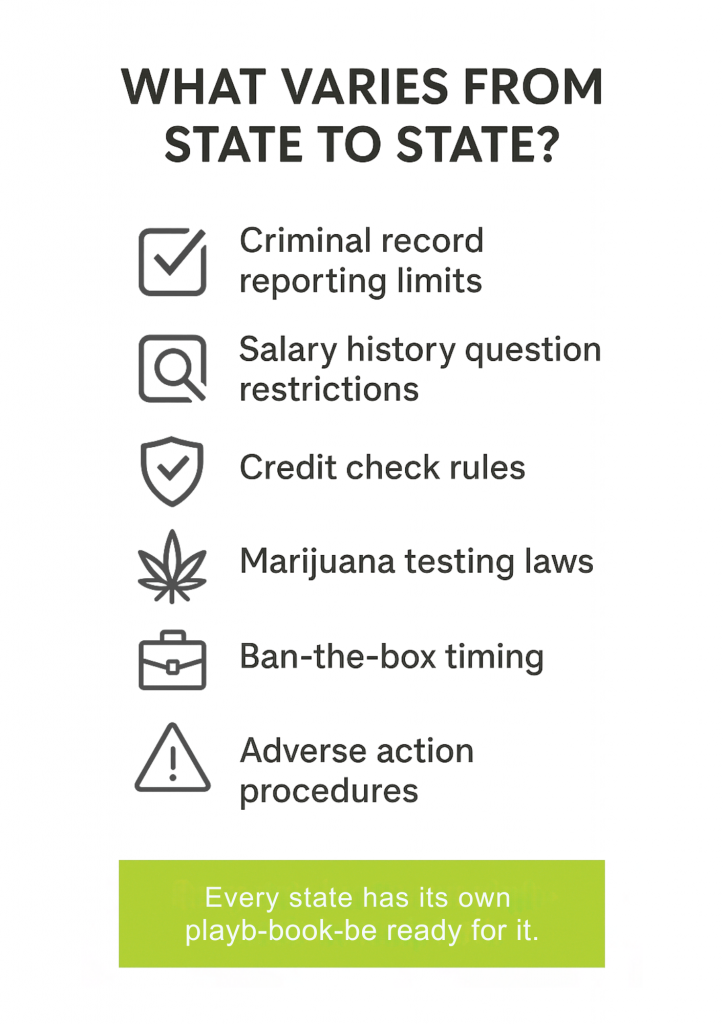Hiring Across State Lines: Managing Background Check Variability
As remote and hybrid work continue to reshape the hiring landscape, employers are increasingly onboarding candidates across state lines. While this opens up access to a broader talent pool, it also introduces a significant compliance challenge: background check laws vary from state to state.
Understanding and navigating these differences is crucial for HR teams and hiring managers who want to maintain compliance, avoid legal pitfalls, and ensure a fair hiring process. Here’s how to manage background check variability when hiring across the United States.
Understand That Background Checks Are Governed at the State Level
While the Fair Credit Reporting Act (FCRA) sets the national baseline for background checks, individual states have their own additional rules. These differences can affect what criminal records can be reported, how far back checks can go, whether credit history can be used in hiring decisions, and how employers must notify or get consent from candidates.
For example, California limits the reporting of convictions to seven years, while in states like Texas or Florida, there may be no time restriction at all.
Tip: Always review the state-specific laws of both the candidate’s residence and the state where they will be working (if different).
Watch for Ban-the-Box and Fair Chance Laws
As of 2025, more than 35 states and over 150 local jurisdictions have enacted “ban-the-box” or “fair chance” laws. These laws often delay when an employer can ask about criminal history or run a background check. In many areas, employers must wait until after a conditional offer has been made. Some locations also require additional steps before making a final decision based on background results.
Action Step: Review your job application process, conditional offer language, and adverse action steps to stay compliant in each jurisdiction where you hire.
Mind Salary History and Credit Check Restrictions
A growing number of states restrict the use of salary history or credit reports in employment decisions. For instance, Massachusetts, California, and New York prohibit asking about a candidate’s past pay. Credit report use is also limited in many jurisdictions unless the role specifically requires financial responsibility.
Before applying salary or credit checks across the board, ensure that your process is tailored to the laws of the candidate’s location and role.
Make Your Policy Flexible by Design

A one-size-fits-all screening policy may put your company at risk. Instead, design a policy that allows for customization based on legal requirements. Work with your background screening provider to apply state-specific filters, disclosures, and consent forms as required. Building flexibility into your workflow ensures you stay compliant without slowing down your hiring process.
Partner Tip: Select a provider that actively monitors state and local law changes and can notify your team when updates are required.
Keep Your Team Informed and Aligned
Compliance isn’t just about policy—it’s about execution. Train your recruiters and HR staff to understand when and how to initiate background checks in accordance with local laws. Ensure everyone follows the same documentation procedures, especially when taking adverse action.
State laws can change rapidly, so it’s essential to review your background screening process regularly and make adjustments as needed.
Your Strategic Advantage
Hiring across state lines can be a strategic advantage, but it requires careful attention to variations in background check requirements. By tailoring your approach to state-specific laws and building compliance into every step of your hiring process, you reduce legal risk while supporting a fair and effective evaluation of candidates.
At Private Eyes, we help employers navigate the complexities of multi-state hiring with customized, compliant background screening solutions. Contact us today to discover how we can help you achieve your hiring goals nationwide.
Key Takeaways
- Background check laws vary by state—know the rules where your candidate lives and works.
- Ban-the-box laws may require delaying criminal background checks until after a job offer.
- Some states ban salary history questions or restrict the use of credit reports in hiring
- Your background screening policy should be flexible and adaptable by location.
- Keep your HR and recruiting teams trained on local compliance and documentation
- Work with a screening provider that keeps up with state-by-state legal changes
Have questions? Speak to a Private Eyes expert for more information.
